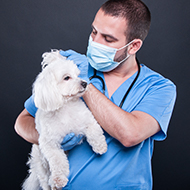New RCVS coronavirus survey launched

"We know that it has been an extremely tough period of time for the professions." - Lizzie Lockett, RCVS CEO.
The RCVS has recently launched a new coronavirus survey that aims to measure and understand the individual impact of the coronavirus pandemic on members of the professions.
Questions will be asked about the impact of the pandemic on areas including amount of hours worked and working patterns, and home-schooling duties, caring responsibilities, self-isolation, and other pandemic-specific factors have affected veterinary professionals' working lives and ability to work.
RCVS CEO Lizzie Lockett commented on the survey: “While our previous six coronavirus impact surveys have involved taking a snapshot of the more immediate situation for veterinary businesses at the various different stages of the crisis, this survey is about taking a deeper, retrospective look at the impact on the personal and professional lives of our members in the last year and a half.”
Those taking the survey will also be asked to sum up their personal experiences of the COVID-19 pandemic, such as how supported they felt by employers, and the impact of the pandemic on their mental health and wellbeing.
Additional questions will be asked to professionals working in clinical practice, to find out information about access to personal protective equipment, remote consultations, and other practice-specific questions.
Lockett added: “This survey, which is confidential, is an opportunity for members of the professions to give a frank and honest account of what has happened since March 2020 and how they have felt.
“We would strongly encourage people to engage with the survey as it will help us at the RCVS to gain a deeper understanding of your experiences, help us to respond to any future waves of the pandemic, supply evidence to Government about any impact to support future guidance changes, and capture a snapshot of this historic period.”
The confidential online survey is conducted by the Institute for Employment Studies (IES) on behalf of the RCVS, and will be accessible for responses until Monday, 23 August 2021.
Prospective participants will be emailed a link to the survey, using the email addresses held by the RCVS, and those who have not received an email by 26 July are being asked to contact Sara Butcher on Sara.Butcher@employment-studies.co.uk



 The Animal and Plant Health Agency (APHA) has updated its online reporting service for dead wild birds.
The Animal and Plant Health Agency (APHA) has updated its online reporting service for dead wild birds.